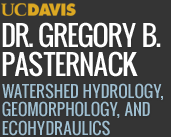Committee Advisees
Current Committee Advisees
MS Committee Advisees
- none
PhD Committee Advisees
- Michael Koohafkan (fluvial geomorphology)
- Alex Morelan (alluvial fans across fault slips)
- Noelle Patterson (environmental flows)
Past Committee Advisees
Past MS Committee Advisees
- Huajin Chen - '18
- Dan Nylen- '14
- Belize Lane- '14
- Stanford Gibson- '13
- Sarah Martin (UC Merced)- '09
- Kerry Cook- '08
- Eric Booth '06
- Steve Winter '03
- Chris Hammersmark '03
- John Wooster '03
- Candice Fehr Constantine '02
- Rudolph Akoutey '02
- JoAnn Kollar '01
- Steve Blake '01
- Till Angermann '01
- Sarah Yarnell- '00
Past PhD Committee Advisees
- Desmond ofosu anim (Univeristy of Melbourne- Burnley)- '19 (urban ecohydraulics)
- Doug George- '16 (coastal sediment transport around headlands)
- James McConaghie- '14 (urban stream water quality)
- Dane Behrens- '13 (coastal lagoon mouth dynamics)
- Emi Uchida- '06 (environmental economics of logging in China)
- Yen-Ben Cheng- '06 (Remote sensing of forests)
- Joe Merz- '04 (Regulated gravel river rehabilitation)
- Stephen Newbold- '02 (optimization of prioritization of land patches for environmental managementactions)
Information for Prospective Committee Advisees
Ms and PhD degrees require graduate students to have research committees composed of 3 faculty who help guide the student through their research. Ideally, committee members contribute scientific ideas to the student on a regular basis and are collaborators on the project. A functional committee not only teaches a student how to do research, but also demonstrates how to collaborate as a team. This document provides information for students who would like me to serve on their graduate committees. The purpose of the information is to foster a clear and effective dialogue between myself and my advisees.
I. Professor Pasternack’s Expectations
1. To be introduced to you
a. What is your schooling background?
b. What is your research background?
c. What do you do for fun?
2. To be introduced to the research project through a meeting with you.
a. Bring visual aids including site map, relevant background figures, list of key references, and results of any preliminary work.
3. To hear your own expectations for the project as well as those of your primary faculty advisor.
a. What hypotheses do you have?
b. Which hypotheses are most important? Achievable?
c. In what ways are your ideas different from your advisor’s?
4. To be informed how you hope I can help you.
a. What are your expectations of me?
b. How do you want to hold me accountable?
II. Process of becoming an advisee after initial meeting
If I am qualified, able, and willing, then I will grant a tentative approval to serve on your committee.
With tentative approval, you have 1 quarter to submit a general plan of work that contains 2 things:
a. A coursework plan consistent with your graduate program
b. A research plan listing broad categories of work and the planned dates of completion for each.
·be as specific as possible in the research plan
·be realistic about deadlines knowing your course load, work habits, and other time commitments.
III. Advising Program
Once the general plan has been submitted and approved the process of advising begins. You will meet with me once each quarter (including summer) to present results of last quarter's class and research work. There are a total of 8 meetings in a 2-year M.S. program, which is reasonable.
·We will discuss areas of success and areas needing improvement.
·We will focus on methods and discuss which are or not working.
·You will present specific plans for upcoming period.
Quarterly meeting may be postponed briefly if necessary, but should not be missed.
·If 2 in a row are missed, then I am not functioning as an adviser and you are at risk of going off track, so the primary faculty advisor will be notified.
·If 4 meetings in a row are missed, then I must resign from your committee and notify your primary faculty advisor and the graduate group advisor.
IV. Thesis Submission
A first draft of the thesis must be submitted as a complete and coherent document for thorough analysis and critique at least 8 weeks before the final deadline. Faculty are granted 4 weeks to review a thesis or dissertation. A meeting must be scheduled to discuss the first draft. A final copy must be submitted along with a letter detailing how the main problems with the first draft were addressed.


